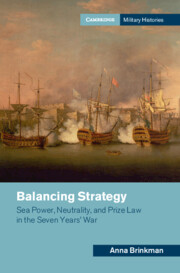Book contents
- Balancing Strategy
- Cambridge Military Histories
- Balancing Strategy
- Copyright page
- Dedication
- Contents
- Acknowledgements
- Introduction
- Part I Sea Power and Its Relationship to Strategy and Law
- Part II The Dutch Case Studies
- 3 Personalities and Policies
- 4 Whose Goods Are These?
- 5 Quelling the Crisis
- Part III The Spanish Case Studies
- Conclusion
- Bibliography
- Index
4 - Whose Goods Are These?
The Maria Theresa and the America in the High Court of Admiralty
from Part II - The Dutch Case Studies
Published online by Cambridge University Press: 25 April 2024
- Balancing Strategy
- Cambridge Military Histories
- Balancing Strategy
- Copyright page
- Dedication
- Contents
- Acknowledgements
- Introduction
- Part I Sea Power and Its Relationship to Strategy and Law
- Part II The Dutch Case Studies
- 3 Personalities and Policies
- 4 Whose Goods Are These?
- 5 Quelling the Crisis
- Part III The Spanish Case Studies
- Conclusion
- Bibliography
- Index
Summary
This chapter focuses on the court cases of the Dutch ships the Maria Theresa and the America. It analyses the legal arguments behind the condemnation of each ship as legal prize and how these arguments are connected to, and differ from, Anglo-Dutch negotiations over neutral rights and the Anglo-Dutch treaty of 1674. The chapter demonstrates that the Anglo-Dutch negotiations at the governmental level were led by four key British figures: William Pitt, Lord Holdernesse, the Duke of Newcastle, and Lord Hardwicke. Their connections with their Dutch counterparts were largely managed through Joseph Yorke who was the British representative to the Dutch Republic. These negotiations were driven by maritime strategic considerations. In contrast, early decisions taken in the High Court of Admiralty created friction between the Dutch and British governments. The Dutch believed that the condemnation of their ships was arbitrary and an abuse of Dutch neutral rights. The chapter reveals that in order to resolve this tension, the British government determined to encourage the Dutch to appeal the decisions from the High Court of Admiralty and promised that the cases would be fairly determined in the Court of Prize Appeal where decisions could be influenced and shaped by Lord Hardwicke.
Keywords
- Type
- Chapter
- Information
- Balancing StrategySea Power, Neutrality, and Prize Law in the Seven Years' War, pp. 73 - 96Publisher: Cambridge University PressPrint publication year: 2024

